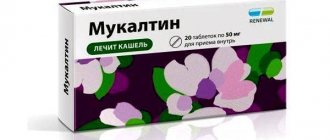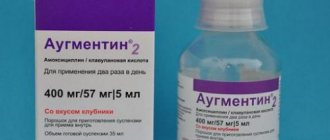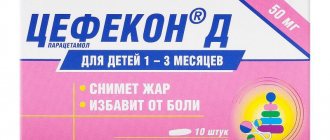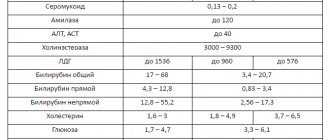Difference from adult drugs
A child’s body, unlike an adult’s, needs a constant supply of vitamin D. This substance promotes the harmonious development of the skeleton and the absorption of beneficial microelements. Therefore, it is very important not to ignore this factor and give the child only children’s medications. They accurately calculate the required amount of all nutrients depending on the age of the baby.
While it is more convenient for an adult to swallow a pill, a one-year-old child may simply choke on it. Therefore, vitamins for them are available in the form:
- syrups and powders (for the little ones);
- lozenges, lollipops, dragees and marmalade (from 2 years).
In addition, unlike tablets, thanks to the interesting shape, smell and color, you can interest your child in taking vitamins.
What vitamins are needed?
Vitamin complexes for the proper growth and development of all body systems for children over 1 year old include the following vitamins:
- Vitamin A. It is necessary for the baby’s vision, bone formation, the functioning of the respiratory system, the functioning of the gastrointestinal tract, the development of mental abilities and the restoration of mucous membranes.
- Thiamine (B1). Takes part in regulating carbohydrate metabolism in the body, is responsible for brain activity and the functioning of the gastrointestinal tract. By consuming this vitamin, the child receives the boost of energy he needs for active games, sports and physical activity.
- Riboflavin (B2). Essential for healthy skin, nails and hair. Responsible for metabolism.
- Pyridoxine (B6). Strengthens the immune system and nervous system, takes part in the synthesis of hemoglobin and red blood cells.
- Folic acid (B9). Responsible for the regeneration processes of the body. Increases appetite and has a good effect on skin condition.
- AT 12. Ensures the functioning of the nervous and cardiovascular systems.
- C. Necessary for children with weakened immune systems, as it protects their body from the adverse effects of the environment.
- D. Regulates the amount of microelements (potassium, magnesium, etc.) in the body and is responsible for the development of the skeletal system.
- E. Strengthens the immune system and muscles. Regulates the functioning of the nervous and circulatory systems.
- N. Maintains a healthy appearance of the skin.
- RR. Participates in metabolic processes, helps absorb fats, proteins, carbohydrates and various microelements.
Depending on age, each of the listed vitamins must enter the child’s body in strictly defined quantities.
Therefore, without the recommendations of a pediatrician, you should not buy first-generation products for your baby that contain only one element.
In the first 2 years of a child’s life, the lack of any vitamins in his body is compensated for by breastfeeding and a balanced diet.
Which ones are the best?

Photo: depositphotos.com Author: kozorog
Moms and dads choose "Multi-tabs"
Today, the greatest trust among parents whose children have reached the age of 3 years is Multi-Tabs vitamins.
Available in two forms: “Multi-tabs Calcium” and “Multi-tabs Vitrum”. The former promote the proper formation of teeth and bones in children from 1 year to 7 years, while the latter help strengthen the general immune system and are intended for children from 1 year to 14 years.
These vitamins are hypoallergenic and have a pleasant taste. The only downside is the size - the tablet is quite large. The effect of taking them is noticeable; many children, even those attending kindergarten, get sick much less often than other peers.
“Jungle” is another leader in the rating
This combined complex contains the following vitamins:
- C (ascorbic acid) – increases resistance to various diseases;
- D3 (cholecalciferol) – does not allow the development of rickets;
- A (retinol palmitate) – important for the proper formation of color vision.
"Jungle Baby" can be prescribed to replenish vitamins A and D, as well as during flu epidemics. This drug can be given to children with diabetes.
Other vitamins intended for use at 3 years of age: Kiddy Pharmaton and Sana-Sol.
How to choose?
Vitamins for children over 1 year of age should be prescribed exclusively by a doctor. Only he can accurately determine which of them a baby needs at a certain age and set the dosage for taking them. Independent choice of vitamins is fraught with the occurrence of problems in the child’s internal organs, an allergic reaction, increased blood pressure and other dangerous consequences.
The doctor will tell parents which vitamins are best for a child aged 1 year and older. Moreover, drugs will be offered that vary in price, release form and manufacturer. Preference should be given to a well-known company, without saving on the child’s health. For children over 1 year old, it is better to choose vitamins in the form of gummies, lozenges and lollipops. They already accurately take into account the dosage of all necessary substances. The same cannot be said about syrups.
For children aged 1 year, choosing the best vitamins means giving preference to natural ingredients. Many marmalade figures contain dyes and artificial flavors, which often cause allergies. Therefore, it is very important to read the composition on the package and purchase multivitamins with juices, extracts and other useful additives.
To identify an allergic reaction, the first few days of taking vitamins, parents should monitor the baby’s diet, excluding dangerous foods. If there is no reaction after 2-3 days, then this drug is suitable for the baby.
What minerals should children drink?
So, after making sure that the child eats vitamins, it is also necessary to take care of a sufficient intake of minerals no less important than vitamins - calcium, essential fatty acids, iron, magnesium, etc.
Calcium strengthens bones and teeth, promotes nerve and muscle function, improves blood clotting, and helps the body convert food into energy.
Essential fatty acids (EFA), along with vitamins for children 5 years old, help build healthy cells, regulate the functioning of the nervous system, strengthen the cardiovascular system and help the body absorb nutrients.
A lack of iron can lead to anemia, fatigue, weakness and irritability in a child. Parents should be very attentive to this mineral, since if a child has eaten vitamin tablets that contain iron in much larger quantities than indicated in the instructions, gastric lavage will most likely be necessary.
Magnesium strengthens bones, equalizes heart rate, supports the immune system, and is also necessary, like many vitamins, to improve memory in children aged five.
Potassium, along with sodium, is necessary to control the water balance in the child's body, which helps maintain normal blood pressure.
Zinc has a positive effect on hormonal levels and promotes the formation and development of brain cells. Its sources are beef, chicken and turkey meat. With its constant deficiency, growth retardation and weakening of the protective barrier of the child’s body are observed.
Another important mineral for the development of a child’s body and necessary along with vitamins for children 5 years old is iodine. It is involved in a number of biochemical reactions and helps regulate metabolism. Its sources include seaweed, seafood and fortified salt. Its deficiency affects brain function, leads to thyroid dysfunction and impaired growth development.
About hypervitaminosis
If vitamins have a pleasant smell and taste, then children will probably want to eat more than the prescribed dose. Therefore, it is very important to keep them out of reach. Some mothers allow the replacement of sweets with marmalade forms of the drug. Under no circumstances should you do this. An excess of useful elements is fraught with the development of hypervitaminosis. This phenomenon is dangerous because it can cause:
- stool disorder;
- loss of appetite;
- seborrhea;
- decreased vision;
- hair loss;
- bleeding gums;
- impaired motor coordination
- insomnia;
- headache;
- failure in the body's metabolic processes;
- cardiopalmus;
- nausea;
- poor blood clotting
- increased nervous excitability;
- numbness of the limbs;
- disruption of the functioning of internal organs and body systems.
All this can be avoided by adhering to the dosage of vitamins. If your child insists on an additional serving, simply replace it with regular marmalade or offer him a healthy alternative in the form of fruit, dried fruit or berries.
Properties of B vitamins

Almost the entire alphabet of these useful biologically active substances is presented in the singular. But group B is a whole family of vitamins, and each one is needed for some reason:
- B1 – thiamine – for metabolism, the functioning of the cardiovascular system (CVS), the full functioning of the nervous system (NS);
- B2 – riboflavin – for protein and fat metabolism, full development of the whole organism, good condition of the skin and mucous membranes;
- B3 – nicotinic acid – for the functioning of the cardiovascular system, the nervous system, regulation of the activity of the adrenal glands;
- B4 – choline – for good memory, concentration, normal functioning of the nervous system and proper lipid metabolism;
- B5 – pantothenic acid – for the formation of the required amount of hormones, proper functioning of the nervous system, and the full functioning of the immune system;
- B6 – pyridoxine – for the completeness of all processes of hematopoiesis (blood formation), protein metabolism;
- B7 – biotin – for regulating blood sugar, development and correct functioning of the nervous system;
- B9 – folic acid – for proper protein metabolism, high-quality hematopoiesis;
- B12 - cyanocobalamin - for proper hematopoiesis (this is its main participant), any metabolic processes in the body, productive mental activity.
In general, all B vitamins are water-soluble substances that are active in:
- hematopoiesis (control the processes of hematopoiesis, participate in the formation of the main blood elements, such as red blood cells, leukocytes and platelets);
- immunogenesis (help create antibodies, which are the body’s response to pathogenic antigens, that is, bacteria and viruses);
- formation of correct hormonal levels;
- coordinated work of the SSS and SB;
- high-quality brain function;
- metabolic processes (metabolism);
- growth and development of both individual cells and tissues and the entire organism as a whole.
So the whole group is very useful and important, especially for a growing and active organism. But the main thing here is not to overdo it, and give the vitamins the baby needs in the right dose.
Classification
What are vitamins? They are divided into the following types depending on their composition:
- Monocomponent drugs.
- Multivitamins. Contains 2 useful elements.
- Complex of vitamins and minerals. It contains most of the vitamins and minerals the body needs.
They are produced in the following forms:
- pills;
- marmalade;
- syrup;
- drops;
- lollipops;
- gel;
- powders.
It is impossible to predict which vitamins a 1-year-old child will prefer.
Taking them can be especially important in the autumn-spring period, when the immune system needs to be strengthened, and children walking on playgrounds can already infect each other with viruses and bacteria. But even at this time, the purchase of drugs must be agreed upon with the attending physician.
The best children's vitamin complexes
Today in pharmacies you can find a wide range of vitamins for children. In order not to try everything at once, below we have given you an overview of the best complexes. They can have different directions, so it is very important to read the instructions in the package.
Multi-tabs
This vitamin complex comes from Denmark. It is available in the form of syrups or tablets. The drugs vary according to the needs and characteristics of the body:
- Multi-tabs baby. This is the best complex designed for children from 1 to 4 years old. It is completely hypoallergenic, as it does not contain synthetic components, only beneficial vitamins and microelements.
- Multi-tabs Sensitive. This is a complex of vitamins for children sensitive to allergenic components.
- Multi-tabs baby Calcium +. Designed for children 2-7 years old. The complex is enriched with calcium and is recommended during the formation of the child’s skeleton during teething or a sharp growth spurt.
- Multi-tabs Junior. Vitamin complex for adult children from 4 years old. Helps the body develop fully and harmoniously.
Alphabet
Russian vitamin complex with natural ingredients. It takes into account all recommendations for separate and joint intake of vitamins.
- Our Baby. For small children from 1 to 3 years old. This fortified powder can easily be added to your baby’s food or drink. Contains vitamin D3, necessary to prevent the development of rickets.
- Kindergarten. This complex is suitable for children aged 3 years and older attending public institutions. Available in the form of chewable lozenges. It improves the baby's brain activity, helps him resist harmful environmental influences and promotes emotional adaptation.
- Schoolboy. Complex for school-age children (from 7 years old). Also available in chewable tablet form. Reduces emotional stress and improves brain activity.
VitaMishki
Vitamin complexes from the USA, produced in the form of marmalade figures. Suitable only for children over 3 years old and made using natural ingredients.
- VitaMishki Immune +. Strengthen the immune system and protect the body during colds.
- VitaMishki Multi +. They contain components responsible for brain activity, memory and attention.
- VitaMishki Calcium +. Strengthen the skeleton.
- VitaMishki Bio +. Restore beneficial intestinal microflora, improving digestion.
- VitaMishki Focus +. They improve vision due to the content of blueberries.
Vitrum Baby
Vitamin complex in the form of chewable tablets. Contains 12 vitamins and 11 minerals. It is allowed for children over 2 years old. Multivitamins do not contain artificial additives and contribute to the mental and physical development of the baby.
Kinder Biovital
The jelly-like gel, produced in Germany, contains 9 vitamins and an amino acid. Safe even for the youngest children under one year old.
Pikovit 1+ Syrup
This vitamin syrup with a pleasant smell and taste is usually very popular with children aged 1 year and older. It contains ascorbic acid, thiamine, vitamin PP and riboflavin.
Pharmacy vitamins
There are so many dietary supplements and vitamins on the market that it is sometimes quite difficult to navigate among all this variety. We will suggest several brands that are worth paying attention to.
Complivit-ACTIVE Bears
These vitamins are recommended for children aged 3 to 5 years.
Beautiful and bright packaging attracts the baby's first attention, and the pleasant taste of chewable lozenges pleases parents - after all, they do not have to persuade their child to take the pill - they themselves ask to give it to them.
These children's vitamins for immunity from 3 years old contain all B vitamins, as well as ascorbic acid and vitamin E. All this is necessary for the child's body for proper development and protection against infections. Thus, taking “ Complivit-ACTIVE ” has a direct effect on the body’s ability to resist colds and infections.
Supradin KIDS
There are different variations of this vitamin complex. The one that directly affects the children's immune system is called “Supradin KIDS Immune”. It contains vitamins of groups “A”, “C”, “D”, as well as vitamins of group “B”.
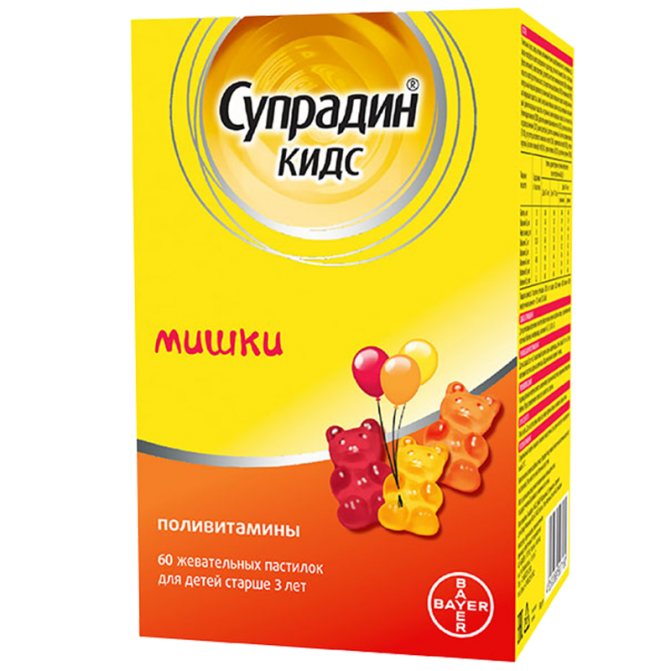
In addition, it contains zinc, iron and sea buckthorn - a powerful natural immunostimulant. This whole complex in “Supradin KIDS” makes it amazing for the child’s immune system. The complex is presented in the form of chewable lozenges of 30 or 60 tablets. To get started - to try it - you can buy 30 tablets. It will also cost less.
Univit Kids
In fact, even 5-year-olds can take these vitamins for children over 3 years old to improve their immunity – they are intended for children from 3 to 5 years old. The complex of vitamins helps the body grow and develop properly, and protects it from the invasion of pathogens.
Pikovit Plus
Not being a medicine, Pikovit Plus fully satisfies the body’s need for many vitamins: A, B, C, D, E... in addition, it contains iodine, zinc, iron, calcium, pantothenic acid, folic acid. A balanced composition is exactly what a child’s growing body needs for proper development and protection from infections.
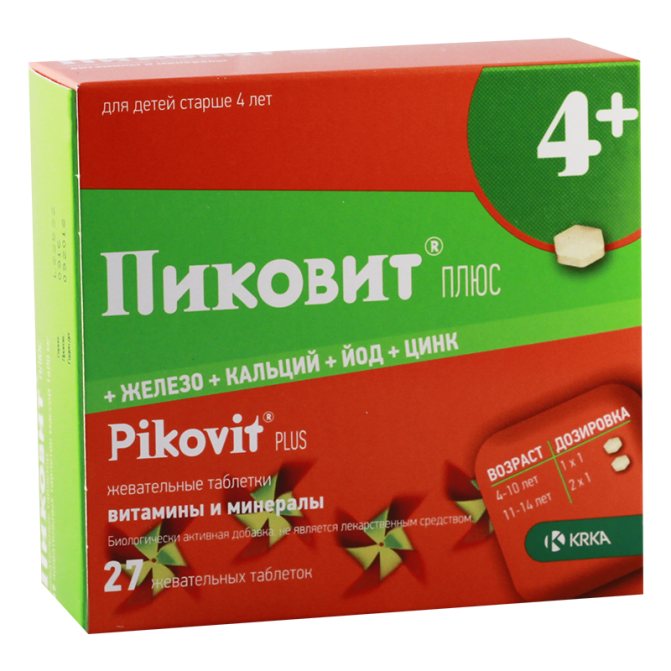
The minimum possible age for taking Pikovit Plus is 4 years.
Alphabet Kindergarten
Another name for these vitamins is “Iron+”. This complex contains vitamins B1 and C, as well as beta-carotene, iron, copper and folic acid. Due to the fact that this vitamin complex energizes the child, it is recommended to take it at breakfast and avoid taking it in the evening or at night to avoid insomnia.
Alphabet Kindergarten is recommended for children aged 5 to 6 years.
We have looked at only a few vitamins here; in fact, there are many more. When you are faced with the task of choosing multivitamins for immunity for children over 3 years old, always read the instructions carefully. Some complexes. Although they are not medicines, they have certain contraindications. And of course, almost all instructions contain one main contraindication - intolerance to certain components in the medicine.
Therefore, if you have already bought some kind of dietary supplement , and your child is experiencing some kind of problem while taking this drug, immediately stop taking it and consult a doctor so that a specialist can select exactly the vitamins that are suitable for a particular situation.
Contraindications and indications for use
Vitamins, like all medicines, have their own list of contraindications and indications. They are prescribed to a child from 1 year of age, when he:
- eats little and unbalancedly;
- moves a lot and actively;
- needs increased immunity;
- is recovering from a serious illness;
- has problems absorbing nutrients from food.
Vitamin complexes are contraindicated in case of hypervitaminosis, kidney disease and sensitivity to the components of the drug.
In the period from 1 year to 2 years, it is not advisable to give children multivitamins with vitamin K, as they weaken the immune system and can cause bleeding.
A doctor's ban on taking vitamin complexes is also considered a contraindication.


